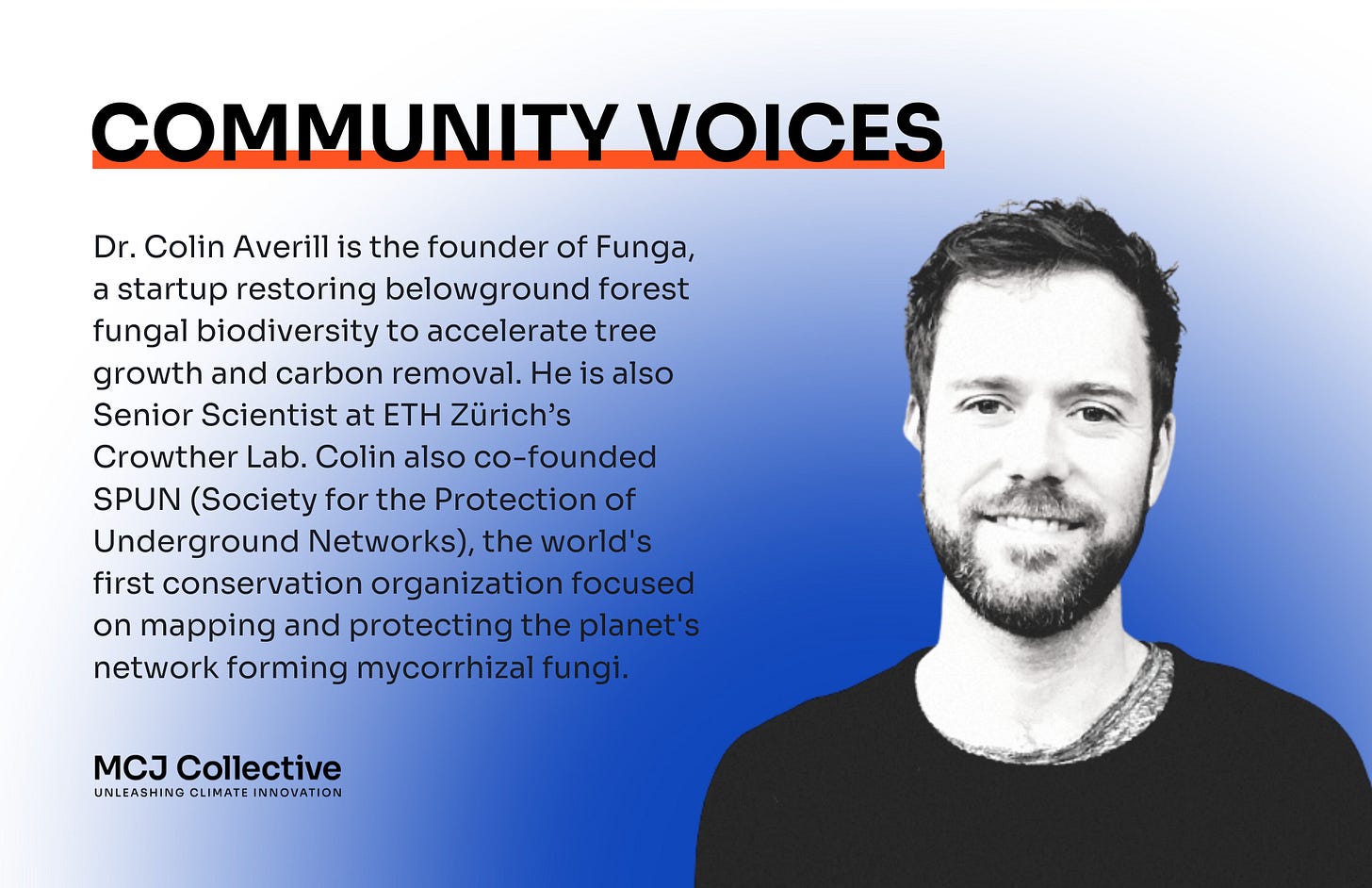Seeing the Forest for the Fungi: Harnessing Fungal Microbiomes to Accelerate Natural Climate Solutions
by Dr. Colin Averill, Founder of Funga
Before we get to forests, let’s start with an ecosystem you might know a bit better - your own body. The human body is a microbial ecosystem. Each of us houses an incredibly biodiverse community of bacteria within our gut, which has profound implications for our health. We call this collection of microorganisms the human microbiome. Losing key aspects of bacterial biodiversity from your microbiome can lead to serious medical conditions. Yet, at the same time microbiome transplants - essentially ecosystem restoration but for your body’s microbiome - can treat many of these conditions. The recent discovery of how the body’s microbial ecosystem affects nearly all aspects of human health is a breakthrough in our understanding and treatment of human health and disease. Perhaps even more profound, this discovery forces us to rethink at a fundamental level what a human is.

Humans aren’t alone in hosting a microbiome. Every plant species on Earth houses an incredibly biodiverse community of fungi and bacteria within plant leaves, seeds and roots. And while we find fungi in both plants and people, fungi seem to play a much bigger role in the forest microbiome. There is actually evidence that when plants first made the evolutionary transition from living in water to living on land, they evolved a symbiosis (i.e. a biological partnership) with soil fungi before they even evolved roots. Many tree species cannot establish in the wild at all if these key symbiotic fungal partners are missing. These billions of species of bacteria and fungi are the plant microbiome, the forest microbiome, the ecosystem microbiome.

Yet, when we plant a tree we rarely think to “plant” the associated microbiome. We know well in forest clear-cuts and degraded environments there is a dearth of key forest symbiotic fungal partners. What would happen if we actively restored the forest microbiome? Colleagues at ETH Zürich’s Crowther Lab and I recently pored through hundreds of academic papers to identify places where scientists had experimentally reintroduced wild soil microbiology as part of an active ecosystem restoration process. What we found was remarkable. Across 81 studies conducted around the world, there was a ~64% increase in plant biomass accumulation on average when a native microbiome was restored alongside native vegetation. Equally fascinating is other research showing that the same approach, but with commercially available microbial inoculants, has little effect. There is something special about wild microbial communities that our commercial efforts to date have not been able to replicate. It’s not enough to pop in a few commercially produced species. We need wild, biodiverse combinations of microorganisms to realize these outcomes.
Just like in human microbiology, the emerging appreciation of how incredible microbial biodiversity affects forest health is forcing us to rethink what a forest is at a fundamental level. It also opens up huge opportunities to accelerate plant growth, and in turn, carbon capture and storage. Can we rewild forest microbiology, and in the process create a carbon removal outcome, combating climate change? Can microbiome restoration accelerate reforestation? Is a microbiome-first approach one path to developing a more regenerative forestry practice?
This research shows how understanding, managing and rewilding the forest microbiome has the potential to unlock huge amounts of carbon capture and removal. The next steps are to build predictability and scale into the practice of forest microbiome restoration. This is why I founded Funga. After 15 years in academia, it’s clear to me that the forest microbiome is one of the biggest levers in forest regeneration and climate action. Furthermore, while academia is incredible at challenging old paradigms and generating new ways to understand the world, it’s not designed to massively scale discoveries on the timelines needed to meaningfully address the biodiversity and climate crises. Embracing the venture model, and building experimentation into the process of scaling allows us to test and iterate at a speed not possible in academic science.
The potential for microbiome restoration to create significant outcomes likely extends to every natural and managed landscape on Earth. It’s easy to get pulled in too many directions at once, and as a result, fail to execute well in any. At Funga, we’ve chosen to focus, starting with the loblolly pine forests of the American Southeast. Loblolly pine is the biggest U.S. agricultural crop you’ve probably never heard of. The U.S. loblolly pine footprint is ~30 million acres, putting it up there with corn, wheat and soy as a major U.S. agricultural commodity. A huge industrial forestry infrastructure opens the door to operating at scale quickly. Furthermore, loblolly pine is a native tree species to this part of the world. As a result, there is an incredible palette of native fungal and microbial biodiversity to work with to create tree growth and carbon capture outcomes. Finally, we know clear-cut forestry systems result in an incredible loss of fungal biodiversity. That’s both a tragedy and an opportunity. By reintroducing fungal biodiversity that used to inhabit these landscapes we can create tree growth and carbon capture outcomes, as well as a soil biodiversity outcome.
Across forestry, reforestation and beyond, the microbiome plays an essential role in the function of ecosystems. Building microbiome biodiversity and complexity back into the landscape is a huge opportunity to remove carbon from the atmosphere. Equally important, rewilding the microbiome is an opportunity to build more biodiverse, resilient and complete ecosystems.
Check out Dr. Colin Averill’s TED Talk “How to harness the ancient partnership between forests and fungi” for more.
✍️ The Draw-down
Weekly climate art by our MCJ Artist-in-Residence, Nicole Kelner.
🍿 The Lean Back
Rollie Williams is back with an all-new Climate Town video.
📢 Climate Action of the Week
Want to do more? Sign up for the next Climate Changemakers Hour of Action here.
A flurry of rumors about the federal government banning gas stoves has everyone talking about building decarbonization. While there are no plans to ban gas stoves nationwide, dozens of cities have already passed policies requiring new buildings to be fully electrified. Now, we want to flip the gas ban conversation to discuss the benefits of fully electric buildings and encourage similar laws at the state level. Contact your state legislator about passing policy that would require new buildings to be fully electric.
🎙My Climate Journey Podcast
🌎 Cody chatted with Peter Minor, Director of Science and Innovation at Carbon180, and Jack Andreasen, Policy Manager for Carbon Management at Breakthrough Energy, about policy tailwinds for CDR, the categories and methodologies, commercial adoption progress and challenges, how and why buyers approach the space today, and some of the speed bumps CDR will undoubtedly encounter as it scales, including but not limited to fraud and false claims.
💨 Allison Dring, CEO and co-founder of Made of Air, discussed how her company is decarbonizing the built environment using biochar, plus the end-of-life process for permanent carbon sequestration.
👩💻 Climate Jobs
For more open positions, check out the #j-climatejobs channel in MCJ Slack as well as our job board featuring 76 MCJ portfolio companies and over 500 open positions.
Field Service Technician at AMP Robotics (East Coast/US)
Vice President Sales at Arcadia (Remote/US)
Lead Technical Recruiter at Avalanche (Seattle, WA)
Senior Mechanical Engineers at Charm Industrial (San Francisco, CA)
Electrical Quality Assurance Specialist at Crusoe (Arvada, CO)
Finance Director, Capital Markets at Lilac Solutions (Oakland, CA)
Communications Manger at Mill (San Bruno, CA)
Senior Process Engineer at Sublime Systems (Somerville, MA)
Senior Marketing Associate/Manager at Tender (Somerville, MA)
Corporate Finance Manager at Twelve (Remote/US)
✨ Highlights
🗓 January Events
Click the event title for details & RSVP info. For more climate events, check out the #c-events channel in MCJ Slack.
🌎 AMA w/ Peter Minor & Jack Andreasen: TOMORROW! Our latest podcast guests are joining the MCJ Slack community for a 24-hour Ask-Me-Anything session. (1/25)
👭 Women in Climate Meetup: Monthly meetup for women who work in, or want to work in, climate. (1/25)
🇨🇦 MCJ Toronto Meetup: Everyone is welcome to join the networking, discussion, and kick off this community in Toronto! Not a MCJ members exclusive event. (1/26)
🎨 Climate Art Workshop: This month we'll be having a conversation about some of the natural disasters we've been impacted by in our local areas and painting to imagine potential solutions on how to build a resilient climate future. In the end, we’ll have time for a Q&A with Nicole on climate art. (1/31)
MCJ Climate Voices is a free weekly email curating news, jobs, My Climate Journey podcast episodes, and other noteworthy happenings in the MCJ member community.
💭 If you have feedback or items you’d like to include, feel free to reach out.
🤝 If you’d like to become an MCJ community member, apply today






Colin's work is critical for reasons too many to list. Thank you!
It's good work,that needs to be fostered by all